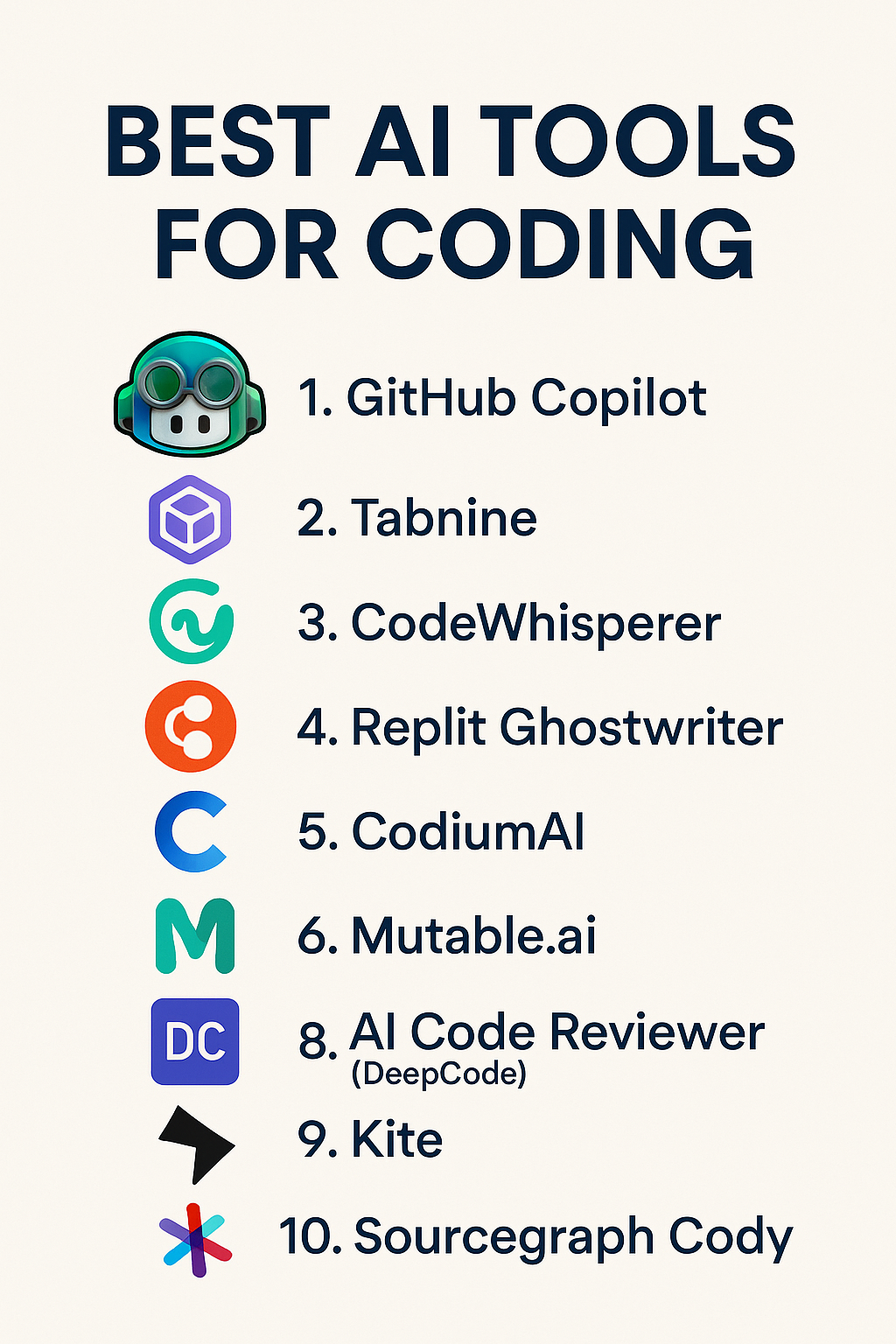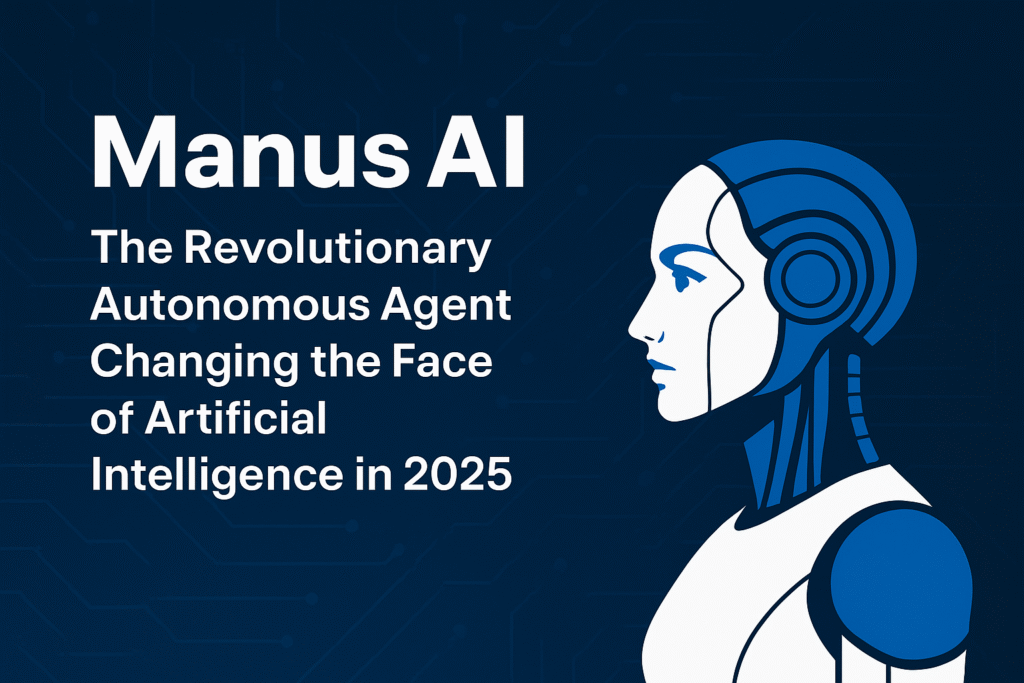
Discover the top 10 best AI tools for coding in 2025 to boost your productivity, write better code faster, and minimize bugs. Perfect for developers of all skill levels.
In the ever-evolving landscape of software development, staying ahead means embracing the power of artificial intelligence (AI). Best AI tools for coding are transforming how developers write, debug, and deploy code. These smart assistants can speed up your workflow, minimize errors, and even help you learn new programming languages faster.
Whether you’re a beginner or a seasoned pro, this list of the best AI tools for coding in 2025 will supercharge your development process.
Why Use AI Tools for Coding?
Before diving into the top picks, let’s explore why AI tools have become essential for developers:
- Faster coding: AI can auto-complete functions, generate code from comments, and provide boilerplate code instantly.
- Fewer bugs: With intelligent error detection and suggestions, debugging is more efficient.
- Increased productivity: Developers can focus more on solving problems and less on repetitive tasks.
- Learning aid: AI tools explain code, suggest optimizations, and help you grasp new frameworks or languages.
Now, let’s dive into the top tools.
Top 10 Best AI Tools for Coding

1. GitHub Copilot
Best For: Code completion and pair programming
GitHub Copilot, powered by OpenAI’s Codex model, is like having an AI-powered coding buddy. It suggests whole lines or blocks of code as you type, based on the context of your project.
Features:
- Auto-completes code in real-time
- Supports multiple programming languages
- Integrates with Visual Studio Code, JetBrains, and more
Use Case: Turn comments into functioning code or generate boilerplate quickly.
2. Tabnine
Best For: AI code completion with customization
Tabnine is another powerful AI coding assistant that learns from your coding patterns and team practices to offer personalized suggestions.
Features:
- Local and cloud models
- Team training models
- Supports 20+ languages
Use Case: Great for teams who want AI to adapt to their coding standards.
3. CodeWhisperer by AWS
Best For: Secure coding in AWS environments
Amazon’s CodeWhisperer is tailored for developers working within the AWS ecosystem. It suggests code snippets, detects security issues, and is particularly effective for Python, Java, and JavaScript.
Features:
- Context-aware code recommendations
- Real-time security scanning
- Native integration with AWS services
Use Case: Secure and fast development in cloud-based applications.
4. Replit Ghostwriter
Best For: Beginners and learners
Replit’s Ghostwriter is built into the browser-based IDE, making it accessible and perfect for beginner coders. It supports auto-completion, bug fixing, and real-time explanations.
Features:
- AI code generation
- Code explanations and documentation
- Collaboration support
Use Case: Ideal for students or hobbyists learning to code.
5. CodiumAI
Best For: Automated test generation
CodiumAI helps you write better tests by understanding your code and generating intelligent test suggestions. It’s especially useful for TDD (Test-Driven Development).
Features:
- Test suggestions based on code analysis
- Works with major IDEs
- Supports Python and JavaScript (with more coming)
Use Case: Automatically generate meaningful tests during development.
6. Mutable.ai
Best For: Rapid code transformation and refactoring
Mutable.ai focuses on optimizing your existing codebase. It helps you refactor code, add documentation, and improve performance.
Features:
- Code refactoring with AI
- Instant docstring and comment generation
- Autocomplete for entire functions
Use Case: Maintain and improve legacy code efficiently.
7. AskCodi
Best For: Code generation from natural language
AskCodi is built to generate code based on plain English queries. It’s ideal for prototyping or translating ideas into working code quickly.
Features:
- Code snippets from plain language
- SQL query generation
- Frontend and backend support
Use Case: Quickly generate functional code without syntax worries.
8. AI Code Reviewer (DeepCode)
Best For: Code quality analysis
DeepCode uses AI to analyze your code for bugs, performance issues, and security vulnerabilities. It’s like having a reviewer working with you 24/7.
Features:
- Deep static analysis
- Language-agnostic support
- Integration with GitHub, Bitbucket, and GitLab
Use Case: Keep your codebase clean and secure with continuous analysis.
9. Kite
Best For: Lightweight AI code suggestions
Kite is a free AI-powered coding assistant that supports over 16 languages and offers fast autocomplete powered by deep learning models.
Features:
- Multi-line completions
- Code documentation lookup
- Works offline
Use Case: Fast and free coding assistance for solo developers.
10. Sourcegraph Cody
Best For: Codebase navigation and documentation
Cody by Sourcegraph excels at answering questions about your codebase. It uses large language models to help you understand large, complex repositories.
Features:
- Search and summarize across files
- Explain code in natural language
- Works well with enterprise-scale codebases
Use Case: Ideal for onboarding new developers or working with massive codebases.
How to Choose the Right AI Coding Tool
Here’s a quick checklist:
| Criteria | Questions to Ask |
|---|---|
| Language Support | Does it support the languages you use? |
| IDE Integration | Does it integrate with your preferred environment? |
| Team Collaboration | Can it adapt to team practices or code styles? |
| Security Features | Does it help catch vulnerabilities early? |
| Pricing | Is there a free plan or trial available? |
Pros and Cons of the Best AI Coding Tools
Each AI coding tool has its own advantages and limitations. Here’s a quick look at the pros and cons of the top 10 tools listed above:
1. GitHub Copilot
Pros:
- Seamless integration with VS Code and JetBrains.
- Offers intelligent suggestions based on context.
Cons:
- Sometimes generates insecure or outdated code.
- No free plan after the trial.
2. Cursor AI
Pros:
- AI-powered IDE with debugging and editing tools.
- Easy to replace, refactor, and comment code using natural language.
Cons:
- Limited integrations compared to VS Code.
- Might not support all frameworks or languages.
3. Codeium
Pros:
- Completely free with support for 70+ languages.
- Fast and lightweight plugin for various IDEs.
Cons:
- Occasional irrelevant suggestions in niche codebases.
- Limited advanced features compared to paid tools.
4. Claude AI
Pros:
- Great for explaining and reviewing code in natural language.
- Long context memory helps with larger projects.
Cons:
- Doesn’t directly integrate into IDEs.
- Not optimized for real-time coding assistance.
5. ChatGPT (with Code Interpreter)
Pros:
- Versatile, supports all languages and use cases.
- Can run code, debug, and analyze data in one place.
Cons:
- GPT-4 (with Code Interpreter) is behind a paywall.
- No direct IDE integration.
6. Perplexity AI
Pros:
- Excellent at finding code-related answers with citations.
- Chat-based and easy to use for research-heavy tasks.
Cons:
- Not a code generator; more useful for explanations.
- Lacks project-specific memory.
7. Grok by xAI
Pros:
- Built to understand and generate code fast.
- Integrated with X (Twitter) for real-time knowledge updates.
Cons:
- Still in early development phase.
- Limited public access.
8. Bolt.new
Pros:
- Create working web app prototypes instantly.
- Time-saving for frontend developers and designers.
Cons:
- Focuses only on UI, not backend logic.
- Not ideal for complex app development.
9. Cody AI by Sourcegraph
Pros:
- Excellent for enterprise codebases and repositories.
- Understands entire projects and suggests smart edits.
Cons:
- Enterprise features may not be available for individual users.
- Interface can be overwhelming for beginners.
10. v0 by Vercel
Pros:
- Transforms text into ready-to-edit UI components.
- Perfect for Figma-to-code workflows.
Cons:
- Only works with Next.js and React frameworks.
- Not suitable for backend or full-stack apps.
Comparison Table: Best AI Tools for Coding in 2025
| Tool | Best Use Case | Free Plan | Integration | Notable Feature |
|---|---|---|---|---|
| GitHub Copilot | Daily coding assistant | ❌ Trial | VS Code, JetBrains | Code suggestions in real time |
| Cursor AI | Debugging & editing | ✅ | Cursor IDE | Replace/fix code via prompts |
| Codeium | Lightweight AI help | ✅ | VS Code, JetBrains | Free forever for all languages |
| Claude AI | Code review/explanation | ✅ | Web-based | Long memory for big projects |
| ChatGPT | All-purpose assistant | ✅ | Web, API | Code Interpreter + GPT-4 |
| Perplexity | Research & explanation | ✅ | Web, mobile app | Cited sources in answers |
| Grok | Fast code generation | ✅ | Twitter/X platform | Built for developer discussions |
| Bolt.new | UI prototyping | ✅ | Web-based | From prompt to working UI fast |
| Cody AI | Large codebases | ✅ | VS Code, Sourcegraph | Understands entire repositories |
| v0 by Vercel | Frontend generation | ✅ | React/Next.js stack | Converts ideas into UI |
Real-World Use Cases of AI Coding Tools
Here are some practical ways developers are using these AI tools in 2025:
- Rapid Prototyping: Designers use v0 by Vercel to turn text into styled React components in seconds.
- Debugging Made Easy: With Cursor, developers fix bugs just by highlighting errors and typing a prompt.
- Learning New Languages: Students rely on ChatGPT and Codeium to explain unfamiliar Python or JavaScript functions.
- Speeding Up Research: Developers ask Perplexity AI for examples, libraries, or methods, and get instant, cited results.
- Managing Large Codebases: Enterprises use Cody AI to navigate and refactor thousands of lines of code across repositories.
These tools save hours of manual work and make coding smarter, faster, and easier than ever before.
FAQs – Best AI Tools for Coding
Q1. Which AI tool is best for beginners?
Codeium and ChatGPT are great for beginners. They provide free access and clear explanations of code.
Q2. Which tool is best for debugging code?
Cursor AI excels in debugging. You can select your code and ask it to fix or explain the issue.
Q3. Is there a free AI tool better than Copilot?
Yes. Codeium offers many Copilot-like features for free. Cursor AI also has a free plan with powerful capabilities.
Q4. Can these tools build entire apps?
Bolt.new and v0 can generate UI prototypes quickly. But full-stack logic still requires manual input or integration with backend frameworks.
Q5. Are AI coding tools safe to use?
Yes, but always review AI-generated code. Some tools may suggest insecure or outdated code snippets.
Final Thoughts
AI tools are revolutionizing the coding world. From helping you write code faster to ensuring higher quality and security, they’ve become indispensable in modern software development.
Whether you’re freelancing, learning to code, or managing a large development team, these best AI tools for coding in 2025 can streamline your workflow and boost your efficiency.
Pro Tip: Try combining two or three tools (e.g., GitHub Copilot + CodiumAI + DeepCode) for a full-stack AI experience.
Want more AI tool reviews, coding tips, and productivity hacks?
Subscribe to our blog and stay ahead of the curve!
About the Author
Payel Kuilya
Payel is a tech blogger and digital creator passionate about AI, coding tools, and content automation. Through Bartatime, she helps readers discover powerful AI tools that boost creativity, productivity, and smart work in the digital era.
Here are the official links to the best AI tools for coding listed:
- GitHub Copilot – https://github.com/features/copilot
- Tabnine – https://www.tabnine.com
- CodeWhisperer (Amazon) – https://aws.amazon.com/codewhisperer
- Replit Ghostwriter – https://replit.com/site/ghostwriter
- CodiumAI – https://www.codium.ai
- Mutable.ai – https://www.mutable.ai
- AskCodi – https://www.askcodi.com
- DeepCode (AI Code Reviewer) – https://www.deepcode.ai
- Kite – https://www.kite.com (Note: Kite is no longer active but still referenced for historical purposes)
- Sourcegraph Cody – https://sourcegraph.com/cody

https://bartatime.com/manus-ai-autonomous-agent-revolution-2025/
